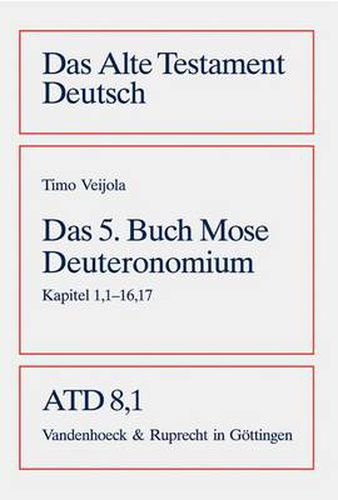Readings Newsletter
Become a Readings Member to make your shopping experience even easier.
Sign in or sign up for free!
You’re not far away from qualifying for FREE standard shipping within Australia
You’ve qualified for FREE standard shipping within Australia
The cart is loading…






Some 40 years after Gerhard von Rad’s volume for the ATD Series, Timo Veijola presents the first volume of his two-volume complete revision of the Deuteronomy text comprising Chapters 1,1-16,17. The fifth book of Moses contains his farewell address to the Israelites and connects the Pentateuch with the books of Joshua through the 2nd Book of Kings. It plays an important role in Old Testament literature and reveals a multilayered evolutionary process that has occupied generations of researchers. Veijola traces the various levels of development, from the reform program of King Joshua during the 7th century BC through the Deuteronomic History to the later revisions of the 4th century BC, and pays tribute to their respective character. In his critical but fair interpretation of Chapters 1-16 the author also provides an overview of the most up-to-date state of research, commenting on both individual exegetic problems and the broad literary and theological horizon of the text.
$9.00 standard shipping within Australia
FREE standard shipping within Australia for orders over $100.00
Express & International shipping calculated at checkout
Some 40 years after Gerhard von Rad’s volume for the ATD Series, Timo Veijola presents the first volume of his two-volume complete revision of the Deuteronomy text comprising Chapters 1,1-16,17. The fifth book of Moses contains his farewell address to the Israelites and connects the Pentateuch with the books of Joshua through the 2nd Book of Kings. It plays an important role in Old Testament literature and reveals a multilayered evolutionary process that has occupied generations of researchers. Veijola traces the various levels of development, from the reform program of King Joshua during the 7th century BC through the Deuteronomic History to the later revisions of the 4th century BC, and pays tribute to their respective character. In his critical but fair interpretation of Chapters 1-16 the author also provides an overview of the most up-to-date state of research, commenting on both individual exegetic problems and the broad literary and theological horizon of the text.